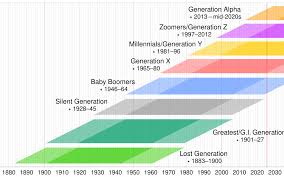The Significance of Gen Z Years in Contemporary Society

Introduction
The years defining Generation Z, often referred to as ‘Gen Z,’ play a crucial role in shaping the future of society. Born from the mid-1990s to the early 2010s, this cohort is the most digitally savvy generation to date, influencing trends across various sectors including technology, social media, and even political landscapes. Understanding the values, preferences, and characteristics of Gen Z is essential for businesses, educators, and policymakers aiming to engage effectively with this dynamic group.
The Characteristics of Gen Z
Gen Z is distinctively recognised for their proficiency with technology; they are true digital natives who have grown up with smartphones, social media, and instant access to information. According to a 2023 report from the Pew Research Center, around 95% of teenagers within this generation have access to a smartphone, and more than 45% are online almost constantly. This reliance on digital communications has shaped their interpersonal skills and views on privacy and security.
Moreover, Gen Z places a high value on inclusivity, diversity, and social justice. They are reported to actively support brands and organisations that align with their values. A survey by McKinsey found that 70% of Gen Z consumers changed their buying habits in 2022 to demonstrate social responsibility, showing that ethics play a crucial role in their consumer behaviour.
Impact of Gen Z on Workplaces
As members of Gen Z continue to enter the workforce, they bring with them a unique perspective that is challenging traditional employment models. They favour flexible working arrangements, a strong work-life balance, and transparent company cultures over merely high salaries. According to a survey conducted by Deloitte in 2023, 83% of Gen Z professionals seek employers that prioritise mental health and well-being, indicating a shift in workplace expectations.
Conclusion
The impact of Gen Z years transcends trends, affecting consumer behaviour, workplace dynamics, and societal values. As this generation continues to mature and gain influence, their emphasis on digital connectivity, social responsibility, and well-being is likely to shape future developments across various sectors. For businesses, educators, and civic leaders, adapting to the attributes and expectations of Gen Z may not only be beneficial but essential, promising a more inclusive and forward-thinking society as we move ahead.









